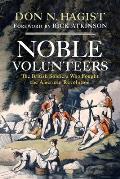Christopher Machell and the Additional Companies
Earlier this month I wrote about Capt. Christopher Machell of His Majesty’s 15th Regiment of Foot.
Some sources have said that British officer was wounded at the Battle of Bunker Hill, and I knew his regiment wasn’t even in North America at that time. Apparently more reliable sources said he was wounded in the “Battle of New York,” but when that was remained a mystery.
Also a mystery: Why if Machell lost an arm in 1776 did he remain on the regiment’s rolls through the end of the war?
I was pleased but not surprised to receive answers from Don Hagist, author most recently of Noble Volunteers: The British Soldiers Who Fought the American Revolution and editor of the Journal of the American Revolution.
Here’s Don Hagist as this month’s guest blogger, plugging the holes in that short series about Capt. Machell:
During the American Revolution British regiment on service in America maintained a cadre of officers and non-commissioned officers in the British Isles for recruiting. Called “Additional Companies”, these were not companies in a structural sense, but financial vehicles to allow for the expenses of the recruiters, and for the recruits.
Every so often, when enough recruits had been raised and trained, they were sent to America under care of one of the Additional Company officers, and an officer in America returned to Britain to join the recruiting service.
As the war progressed, it was quite common for wounded officers to return to Britain to recover, and joining the Additional Companies was a way to keep them at full pay and working while they convalesced.
Captain Christopher Machell commanded the 15th Regiment’s light infantry company, and was wounded at the battle of Harlem Heights on “New York Island” on 16 September 1776. Because he was no longer fit for that company’s active service, he was transferred into a battalion company, then the following June joined the Additional Companies in Great Britain, where he remained for the rest of the war.
Thanks, Don!
Some sources have said that British officer was wounded at the Battle of Bunker Hill, and I knew his regiment wasn’t even in North America at that time. Apparently more reliable sources said he was wounded in the “Battle of New York,” but when that was remained a mystery.
Also a mystery: Why if Machell lost an arm in 1776 did he remain on the regiment’s rolls through the end of the war?
I was pleased but not surprised to receive answers from Don Hagist, author most recently of Noble Volunteers: The British Soldiers Who Fought the American Revolution and editor of the Journal of the American Revolution.
Here’s Don Hagist as this month’s guest blogger, plugging the holes in that short series about Capt. Machell:
During the American Revolution British regiment on service in America maintained a cadre of officers and non-commissioned officers in the British Isles for recruiting. Called “Additional Companies”, these were not companies in a structural sense, but financial vehicles to allow for the expenses of the recruiters, and for the recruits.
Every so often, when enough recruits had been raised and trained, they were sent to America under care of one of the Additional Company officers, and an officer in America returned to Britain to join the recruiting service.
As the war progressed, it was quite common for wounded officers to return to Britain to recover, and joining the Additional Companies was a way to keep them at full pay and working while they convalesced.
Captain Christopher Machell commanded the 15th Regiment’s light infantry company, and was wounded at the battle of Harlem Heights on “New York Island” on 16 September 1776. Because he was no longer fit for that company’s active service, he was transferred into a battalion company, then the following June joined the Additional Companies in Great Britain, where he remained for the rest of the war.
Thanks, Don!


